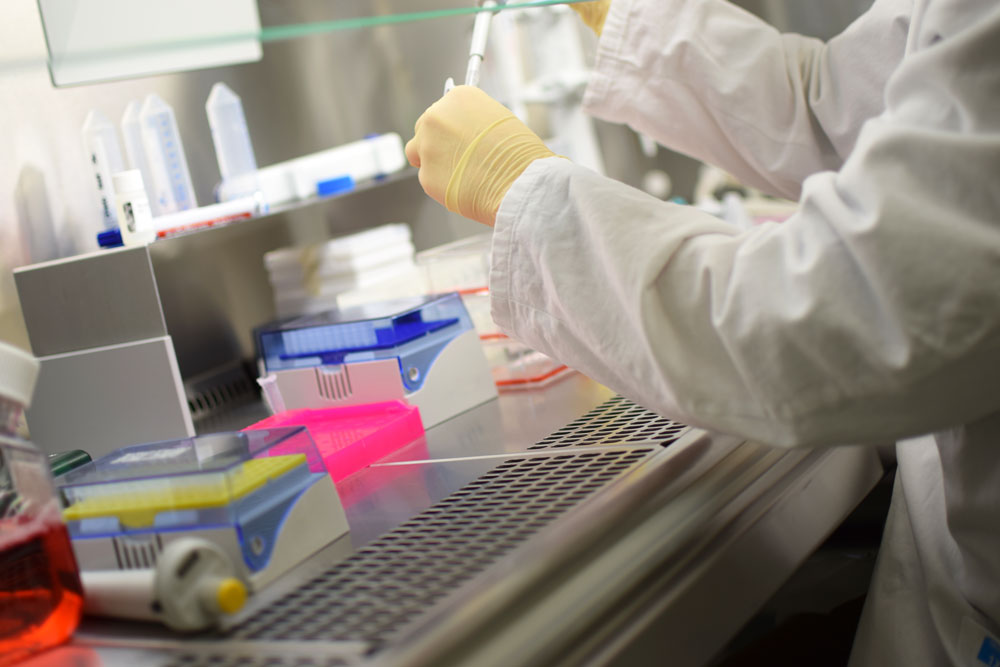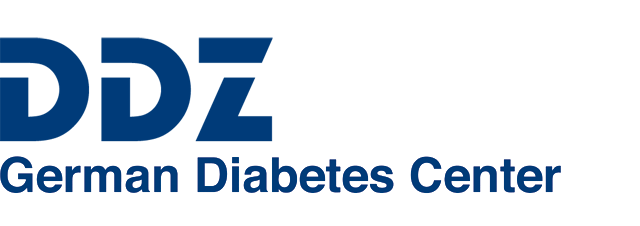
Molecular basis for the development of obesity, insulin resistance and type 2 diabetes
Our group investigates the molecular basis of onset and progression of obesity, insulin resistance and type 2 diabetes. In a genetics approach, polygenic mouse models are used to identify novel susceptibility genes and relevant pathomechanisms for obesity and diabetes. Our group focuses on the molecular analysis of insulin action with respect to glucose and lipid metabolism, gene/gene and gene/environment interactions, and associated metabolic impairments of insulin-target tissues in diabetes.
Current aims
- Identification of susceptibility genes and gene/environment interactions in polygenic mouse models for insulin resistance and diabetes
- Function of the TBC1D-family GAPs and GEFs in lipid and glucose metabolism
- Pathogenesis of insulin resistance
Our group closely collaborates with the Research Group Energy Metabolism of the Institute for Clinical Diabetology and the Research Group Beta Cell Defects of the Institute for Vascular and Islet Cell Biology.
Team
Univ.-Prof. Dr. rer. nat. Hadi Al-Hasani
Head
Research Group Pathochemistry
+49 211 3382-241
Dr. rer. nat. Alexandra Chadt
Deputy head
Research Group Pathochemistry
Visiting personnel (Heinrich-Heine-Universität Düsseldorf)
+49 211 3382-577
-
Dr. rer. nat. Delsi Altenhofen
-
Kevin Brors, M. Sc.
-
Jasmine Decker, M. Sc.
-
Dagmar GrittnerVisiting personnel (Heinrich-Heine-Universität Düsseldorf)
-
Carina Heitmann
-
Mark Hennig
-
Julian Hogenkamp, M. Sc.
-
Angelika Horrighs
-
Katharina Kaiser, M. Sc.
-
Birgit Knobloch
-
Anette KurowskiVisiting personnel (Heinrich-Heine-Universität Düsseldorf)
-
Alessandro Minisgallo, B. Sc.
-
Antonia Osmers
-
Prof. Dr. Margriet Ouwens
-
Leon Peifer-Weiß
-
Silja Pirseyedi
-
Heidrun Podini
-
Elham Pourbarkhordariesfandabadi, PhD
-
Dr. rer. nat. Nicole Rockel
-
Dr. rer. nat. Anna Katharina Scheel
-
Joy Janina Servais
-
Sebastian Sill, M. Sc.
-
Dr. rer. nat. Christian A. Springer
-
Dr. rer. nat. Julia Steinhausen
-
Marina Tautz, M. Sc.
-
Dr. rer. nat. Michael Turewicz
-
Patrick Weinkauf, B. Sc.
Selected Publications
- Kjøbsted R, Chadt A, Jørgensen NO, Kido K, Larsen JK, de Wendt C, Al-Hasani H, Wojtaszewski JFP 2019. TBC1D4 is Necessary for Enhancing Muscle Insulin Sensitivity in Response to AICAR and Contraction. Diabetes. 68: 1756-1766. https://doi.org/10.2337/db18-0769
- Hörbelt T, Tacke C, Markova M, Herzfeld de Wiza D, Van de Velde F, Bekaert M, Van Nieuwenhove Y, Hornemann S, Rödiger M, Seebeck N, Friedl E, Jonas W, Thoresen GH, Kuss O, Rosenthal A, Lange V, Pfeiffer AFH, Schürmann A, Lapauw B, Rudovich N, Pivovarova O, Ouwens M 2018. The novel adipokine WISP1 associates with insulin resistance and impairs insulin action in human myotubes and mouse hepatocytes. Diabetologia. 61: 2054-2065. https://doi.org/10.1007/s00125-018-4636-9
- Stermann T, Menzel F, Weidlich C, Jeruschke K, Weiß J, Altenhofen D, Benninghoff T, Pujol A, Bosch F, Rustenbeck I, Ouwens M, Thoresen GH, de Wendt C, Lebek S, Schallschmidt T, Kragl M, Lammert E, Chadt AS, Al-Hasani H 2018. Deletion of the RabGAP TBC1D1 leads to enhanced insulin secretion and fatty acid oxidation in islets from male mice. Endocrinology. 159: 1748-1761. https://doi.org/10.1210/en.2018-00087
- Schallschmidt T, Lebek S, Altenhofen D, Damen M, Schulte Y, Knebel B, Herwig R, Rasche A, Stermann T, Kamitz A, Hallahan N, Jähnert M, Vogel H, Schürmann A, Chadt A, Al-Hasani H 2018. Two Novel Candidate Genes for Insulin Secretion Identified by Comparative Genomics of Multiple Backcross Mouse Populations. Genetics. 210: 1527-1542. https://doi.org/10.1534/genetics.118.301578
- Mafakheri S, Flörke RR, Kanngießer S, Hartwig S, Espelage L, De Wendt C, Schönberger T, Hamker N, Lehr S, Chadt A, Al-Hasani H 2018. AKT and AMPK regulate TBC1D1 through phosphorylation and its interaction with the cytosolic tail of insulin-regulated aminopeptidase IRAP. J Biol Chem. 293: 17853-17862. https://doi.org/10.1074/jbc.RA118.005040
- Binsch C, Jelenik T, Pfitzer A, Dille M, Müller-Lühlhoff S, Hartwig S, Karpinski S, Lehr S, Kabra DG, Chadt AS, Roden M, Al-Hasani H, Castañeda T 2017. Absence of the kinase S6k1 mimics the effect of chronic endurance exercise on glucose tolerance and muscle oxidative stress. Mol Metab. 6: 1443-1453. https://doi.org/10.1016/j.molmet.2017.08.008
- Chadt A, Immisch A, de Wendt C, Springer C, Zhou Z, Stermann T, Holman GD, Loffing-Cueni D, Loffing J, Joost H-G, Al-Hasani H 2015. Deletion of both Rab-GTPase-activating proteins TBC14KO and TBC1D4 in mice eliminates insulin- and AICAR-stimulated glucose transport. Diabetes 2015;64:746-759. Diabetes. 64: 1492. https://doi.org/10.2337/db15-er04
- Chadt A, Leicht K, Deshmukh A, Jiang LQ, Scherneck S, Bernhardt U, Dreja T, Vogel H, Schmolz K, Kluge R, Zierath JR, Hultschig C, Hoeben RC, Schürmann A, Joost H-G, Al-Hasani H 2008. Tbc1d1 mutation in lean mouse strain confers leanness and protects from diet-induced obesity. Nature Genetics. 40: 1354-9. https://doi.org/10.1038/ng.244
- .
Teaching activities at Heinrich Heine University Düsseldorf
- Interdisciplinary Research Training Group 2576 “vivid - in vivo investigations towards the early development of type 2 diabetes”
http://www.vivid.hhu.de

- Masters Study Programme Molecular Biomedicine
http://www.molekularebiomedizin.hhu.de
National Cooperations
- Partner and associated partner of the German Center for Diabetes Research (DZD e. V.)
- Max-Planck-Institut für molekulare Genetik (MPIMG) Berlin: Dr. Ralf Herwig
International Cooperations
- Lund University, SE: Prof. Dr. Ola Hansson
- Novo Nordisk Foundation Center for Basic Metabolic Research and University of Copenhagen, DK: Prof. Dr. Torben Hansen, Prof. Dr. Jørgen Wojtaszewski
- Universitat Autònoma de Barcelona (UAB), ES: Prof. Dr. Fatima Bosch
- University of Eastern Finland, NO: Prof. Dr. Markku Laakso
- University of Oslo, NO: Prof. Dr. Hege Thoresen
- University of Wisconsin, USA: Prof. Dr. Alan D. Attie
- University of Strathclyde, UK: Prof. Gwyn Gould
- Monash University, AUS: Dr. Georg Ramm
